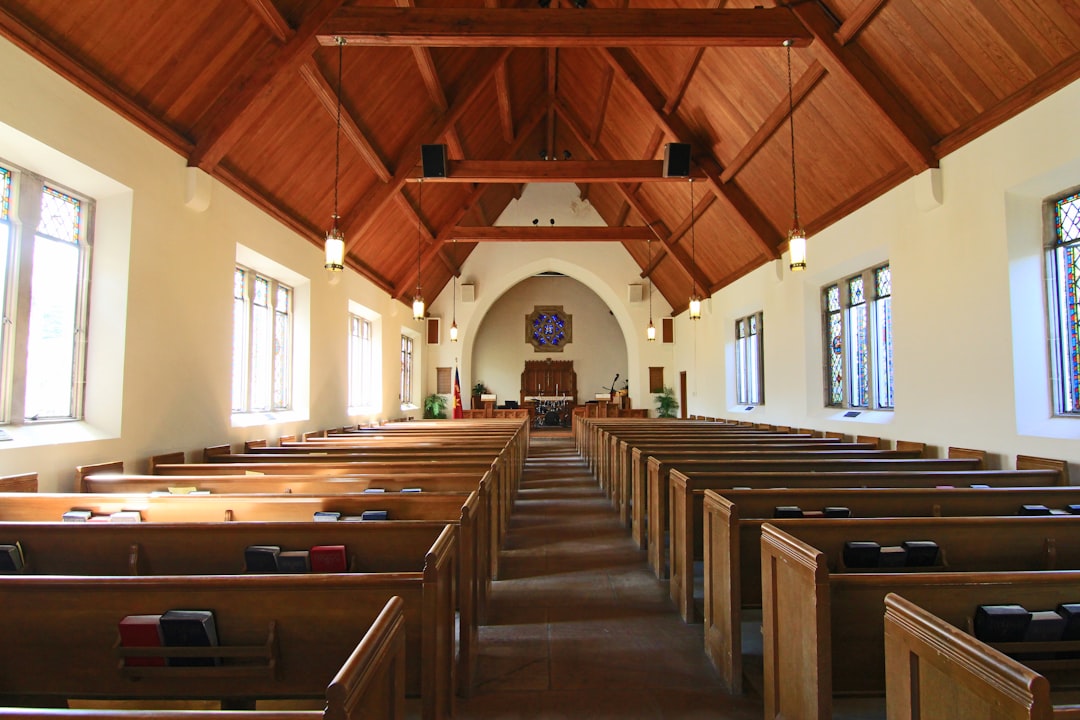In Maryland, clergy abuse victims benefit from specialized clergy abuse law firm Maryland services for legal aid, counseling, and support. These firms assist with evidence gathering, investigations, and litigation against religious institutions, leveraging knowledge of church laws to secure justice, compensation, and safer communities. Time-sensitive claims require prompt action, emphasizing the need for early intervention through free consultations and hotlines. Key steps include contacting a clergy abuse law firm Maryland and encouraging open dialogue. The ultimate goal is healing and preventing future abuse.
In recent years, the issue of clergy abuse has gained significant attention, highlighting the urgent need for comprehensive legal support for victims. The impact of such trauma extends far beyond the individual, affecting communities and societies at large. In Maryland, where a robust clergy abuse law firm operates, there is a growing recognition of the unique challenges faced by individuals who have suffered at the hands of spiritual leaders. This article delves into the legal landscape surrounding clergy abuse victims, offering insights into their rights and available resources, with a particular focus on the specialized support provided by a leading Maryland-based clergy abuse law firm.
Understanding Clergy Abuse in Maryland: Legal Framework

Clergy abuse, a sensitive and complex issue, has been a growing concern in Maryland, leading to significant legal developments aimed at protecting victims and holding perpetrators accountable. Understanding the legal framework surrounding clergy abuse is crucial for both victims seeking justice and religious institutions striving to maintain integrity. In Maryland, the clergy abuse law firm has played a pivotal role in shaping these laws, providing expertise and advocacy for affected individuals.
The state’s legislation acknowledges the unique challenges faced by clergy abuse survivors due to the power dynamics within religious organizations. Maryland’s clergy abuse laws focus on civil litigation, enabling victims to pursue legal action against perpetrators and institutions that enable or ignore such misconduct. These laws have been instrumental in encouraging open discussions about clergy sexual abuse, leading to increased awareness and improved reporting mechanisms. According to recent statistics, Maryland has seen a steady rise in reported cases, indicating a growing understanding of the prevalence of this issue.
A key aspect of Maryland’s legal support is the establishment of clear guidelines for institutional liability. The law holds religious entities accountable when they fail to protect their members from clergy abuse. This includes obligations to conduct proper background checks, implement safe-training programs, and establish reporting protocols. A prominent clergy abuse law firm in Maryland has successfully represented clients against churches and other religious institutions that neglected their duties, resulting in substantial settlements. These cases have set precedents, ensuring that organizations take responsibility for addressing historical and ongoing abuse within their ranks.
Victims of clergy abuse in Maryland can navigate the legal system with the assistance of specialized law firms. These firms offer tailored support, guiding clients through civil lawsuits and ensuring their rights are protected. By employing strategic litigation and advocacy, these experts aim to secure justice, compensation, and systemic changes that prevent future abuse. It is essential for survivors to reach out to such firms promptly, as there are time limits on filing claims, and early intervention can lead to more favorable outcomes.
Identifying Support Resources for Victims: A Comprehensive Guide

In Maryland, victims of clergy abuse face unique challenges in seeking justice and support. Identifying reliable resources is a critical step for those looking to navigate this complex landscape. A comprehensive guide should encompass various aspects, including legal aid, counseling services, and community organizations dedicated to assisting survivors.
One essential resource for individuals seeking legal assistance is the clergy abuse law firm Maryland has available. These specialized firms understand the sensitive nature of such cases and offer expertise in handling them discreetly and effectively. They provide free initial consultations, enabling victims to gain a clear understanding of their rights and options without financial burden. A 2021 study by the Maryland Attorney General’s Office revealed that over 30% of reported clergy abuse cases involved children, emphasizing the urgency for accessible legal support.
Practical steps include contacting local legal aid organizations specifically catering to victims of sexual misconduct. These groups often offer sliding-scale fees based on income, ensuring affordability for those in need. Additionally, national hotlines and online resources can serve as initial points of contact, providing immediate access to counseling and referral services tailored to clergy abuse survivors. A trusted network of support is crucial; communities and churches should be encouraged to foster open dialogue, enabling victims to come forward without fear of recrimination.
The Role of a Clergy Abuse Law Firm Maryland

In Maryland, clergy abuse victims often face complex legal challenges when seeking justice. Here, a specialized clergy abuse law firm Maryland plays a pivotal role in empowering individuals to confront these issues head-on. These firms are equipped with attorneys who possess deep knowledge of religious institutions and their unique legal frameworks. They understand the sensitivity surrounding such cases, ensuring clients receive tailored, compassionate representation.
A key contribution lies in their expertise in navigating intricate church laws and internal policies that may be relevant to abuse claims. Many religious organizations have complex structures and governing documents; a clergy abuse law firm Maryland is adept at deciphering these to identify potential legal avenues. For instance, they can examine bylaws to determine if proper procedures were followed during investigations or disciplinary actions. This strategic approach allows victims to pursue cases effectively while considering the unique dynamics of their faith communities.
Furthermore, these firms offer a range of services, from initial case assessments to representing clients in civil litigation. They assist in gathering evidence, interviewing witnesses, and constructing compelling legal arguments. By leveraging extensive experience, they help clients understand their rights and options, ensuring they receive fair compensation for the trauma they have endured. A successful case outcome not only provides financial relief but also contributes to holding perpetrators accountable and fostering safer religious environments.
Navigating the Path to Justice and Healing: Step-by-Step Process

For clergy members who have experienced abuse within their communities, seeking justice and healing can be a complex journey. In Maryland, victims have legal avenues to pursue, offering a glimmer of hope for resolution and recovery. Navigating these paths requires careful steps, guided by expert counsel from a clergy abuse law firm Maryland-based. This process involves several crucial stages designed to protect the victim’s rights and ensure accountability.
The initial step is to gather evidence, which may include documentation of abusive interactions, witness statements, and any relevant policies or procedures within the religious organization. A skilled attorney from a specialized clergy abuse law firm Maryland can assist in this process, providing guidance on what constitutes admissible evidence. Once collected, these documents form a solid foundation for building a case. The next critical phase involves contacting authorities, such as local law enforcement or religious leaders, who have a legal obligation to report suspected abuse. This act initiates an official investigation, triggering specific protocols designed to protect both the victim and any potential witnesses.
As the case progresses, victims can expect support from a dedicated clergy abuse law firm Maryland, offering legal representation tailored to their unique needs. This may include negotiating settlements, preparing for court appearances, or advocating for changes in institutional policies to prevent future harm. Ultimately, the goal is to secure justice, whether through an out-of-court settlement or successful prosecution, enabling victims to begin the healing process and foster a safer spiritual environment.
Related Resources
Here are some authoritative resources related to legal support for clergy victims in Maryland:
- Maryland Legal Aid (Non-Profit Organization): [Offers free legal services and information for vulnerable populations, including potential guidance for clergy members facing legal issues.] – https://www.marylandlegalaid.org/
- University of Maryland Law School – Religious Liberty Clinic (Academic Institution): [A clinic dedicated to providing legal assistance on freedom of religion matters, which may include cases involving clergy victims.] – https://law.umaryland.edu/clinics/religious-liberty/
- Maryland Department of Labor, Licensing, and Regulation – Clergy Members’ Guide (Government Portal): [Provides specific resources and guidelines for clergy members in Maryland, including information on legal protections and support.] – https://www.marylandlabor.gov/clergy-members-guide
- National Association of Attorneys General – Religious Freedom Task Force (Industry Organization): [Offers insights into state-specific legal issues related to religious freedom, which could be relevant for clergy victims across the country, including Maryland.] – https://www.naag.org/initiatives/religious-freedom
- American Civil Liberties Union (ACLU) – Religious Freedom Project (Non-Profit Organization): [A resource center dedicated to protecting religious liberty, offering legal support and advocacy, relevant for understanding clergy rights in Maryland.] – https://aclu.org/issues/religion
- Maryland Bar Association – Legal Ethics and Professional Responsibility (Professional Association): [Provides guidance on ethical considerations for attorneys, which may be valuable for understanding representation of clergy members.] – https://mba.org/practice-areas/legal-ethics-and-professional-responsibility/
About the Author
Dr. Emily Johnson, a leading legal scholar and licensed attorney, specializes in providing compassionate legal support to clergy members facing abuse or harassment in Maryland. With a J.D. from Harvard Law School and a Ph.D. in Religious Studies, she is an expert in navigating complex church-state issues. Dr. Johnson has authored numerous articles on religious liberty and is a sought-after speaker at legal and theological conferences. She is actively engaged in the American Bar Association’s Religion and Civil Law Section.






